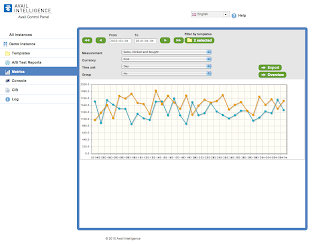With this release the method getRecommendations is introduced. This method will replace all current recommendation methods. Before this release the programmatic API method used defined what input could be used and the type for recommendation generated. With getRecommendations the input used and the type of recommendation generated is set in the Control Panel.
Why a new Method?
The first purpose is to empower non-techies such as e-commerce managers and marketing people to easily change the type of recommendation without having to rely on techies to do this. A safe bet is that this is something that will be appreciated by the person wanting the changes and techies alike.
The second purpose is to allow a more flexible set up of recommendations which gives merchandisers a larger degree of freedom to customize the recommendations to the need of a particular site.
The third purpose is to make it easier for new customers to integrate Avail and for existing customers that want to implement recommendations in new areas as there is only one recommendation method.
The first purpose is to empower non-techies such as e-commerce managers and marketing people to easily change the type of recommendation without having to rely on techies to do this. A safe bet is that this is something that will be appreciated by the person wanting the changes and techies alike.
The second purpose is to allow a more flexible set up of recommendations which gives merchandisers a larger degree of freedom to customize the recommendations to the need of a particular site.
The third purpose is to make it easier for new customers to integrate Avail and for existing customers that want to implement recommendations in new areas as there is only one recommendation method.
The forth purpose is to prepare for upcoming features that we are working on but not quite ready to announce.
Input
The new method getRecommendations takes multiple inputs. The available inputs to base recommendations on are:
- Phrase - A search phrase used on the internal or an external search engine.
- SessionId - The session id of the current session.
- ProductId - A single product identifier. Typically the a product on a product detail page.
- ProductIds - A set of product identifiers. For example a wish-list or a feed from the Facebook App My Bookshelf.
- UserId - A user identifier of a logged-in or identified user.
Output
 |
| Screenshot |
As mentioned the output will be controlled from the Control Panel. On the template level you will be able to set if the output will be products or people. If the chosen output is products, then you will be able to chose if the recommendations should be based on:
- Visitors’ Clicks and Purchases
- Visitors’ Searches
- Manual Rules
- People who bought the products you have viewed also bought
- People who searched on-site selected
 |
| Screenshot |
Old recommendation methods such as getProductPredictions and getRelatedActions will be deprecated. This means that they will continue to work for some time, but all new code with recommendation-requests should be done with getRecommendations. Eventually a transition has to be made as the old methods will stop working. No date for when the old recommendations methods will stop working has been set but this will be announced and communicated well ahead of time so that everyone can do the transition in a orderly manner.
Other Minor Features
With this release it will be possible to apply a dynamic parameter to all subtemplates in a template instead of just one subtemplate.
Also, for those using Avail to return presentation data the float output has been changed to always be at least two decimals. This will result in whole number or one decimal prices being presented as 25.00 and 36.70 instead of 25.0 and 36.7.
A new method has been added: logRemovedFromCart. This method removes a product added to cart with method logAddedToCart as stored in Avail. This is useful when doing recommendations with getRecommendations based on the content of the cart which is derived from the argument session id. It will also affect the products filtered with the template setting Exclude Added to Cart.
Avail OnSite G8.5
OnSite G8.5 will include getRecommendations and the features mentioned in the following posts:
More powerful Recommendations
HTML Control Panel



